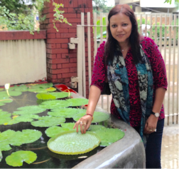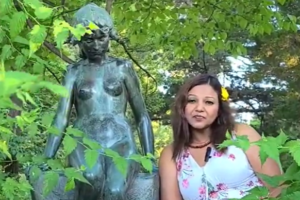One climate activist halted train service by chaining himself to the tracks. Others have glued themselves to busy roads, causing gridlock. And just last week, protesters locked arms to stop people from entering a mining conference before being forcibly dispersed by police officers with pepper spray.
A surge of climate activism is flooding Australia as the country falls behind on its promise to reduce emissions — effectively ignoring the Paris Agreement the Trump administration just abandoned. Prime Minister Scott Morrison has responded with a threat that’s alarmed scientists and free speech advocates, arguing that the government should outlaw “indulgent and selfish” efforts by environmental groups to rattle businesses with rallies and boycotts.
“The right to protest does not mean there is an unlimited license to disrupt people’s lives,” Morrison said, adding, “I am very concerned about this new form of progressivism.”
Australia’s “climate wars,” once confined to election campaigns, are now spilling into the streets with some of the biggest protests the country has ever seen. An increasingly outraged public is demanding action while the conservative national government refuses to budge, relying on the police to squelch dissent.
Australia, of course, is not alone. There have been large climate protests around the globe this year. But while many nations seem willing to tolerate the boycott campaigns and civil disobedience, Australia appears determined to suppress the activism, even as heat waves, drought and fires make the country’s vulnerabilities to climate change ever clearer.
Why has Australia become such an intense climate battleground? The forces defining the conflict are wrapped up in national identity, economics and a growing divide between government and public opinion.
Coal-loving politicians
Two years ago, when Morrison was Australia’s treasurer, he stood up in the House of Representatives with a hunk of black coal in his hand.
“Don’t be afraid. Don’t be scared,” he said. “It won’t hurt you.”
His shiny prop had been shellacked to keep his hands clean, but the point he made then is one he and his governing coalition stand by: Coal is good.
Scientists strongly disagree, warning that the world stands little chance of averting the most dire effects of climate change without ending its reliance on burning coal for energy. But Australia has an emotional and historical connection to it that continues to shape its politics.
The combustible rock was first mentioned in government records soon after British settlement. Now, Australia is the world’s largest coal exporter. It is also a major exporter of natural gas, making for a resource-driven country that is “rich, dumb and getting dumber,” according to one recent headline summarising the findings of a Harvard study that ranked Australia’s economy 93rd in complexity, behind Kazakhstan, Uganda and Senegal.
The mingling of mining interests with national interests is perpetuated through a revolving door: Lawmakers frequently work for the coal industry after leaving office. And for some, defending coal has come to be equated with defending the country.
Even the opposition centre-left Labour Party is hooked, pushing for emissions cuts while continuing to support more coal mining.
“They’re trying to play both sides,” said David Ritter, chief executive of Greenpeace Australia. “They’re avoiding the work that’s necessary to create a clean energy economy.”
An increasingly angry public
Poll after poll shows growing concern about climate change among Australians of all ages and political persuasions.
In September, a survey by the Australia Institute found that 81% of Australians believe climate change will result in more droughts and flooding (up from 78% in 2018). Two out of three Australians agreed that the government should plan for an orderly phaseout of coal, while 64% said Australia should aim for net-zero emissions by 2050.
And researchers continue to sound the alarm. A paper co-written by an Australian scientist and signed by 11,000 other experts warned on Wednesday of a clear “climate emergency.”
“There is high concern in Australia about climate change, but the political process doesn’t seem to be responding at all,” said David C Holmes, director of Monash University’s Climate Change Communication Research Hub, which focuses on climate literacy.
As a result, he added, “certain segments of the population get very frustrated — more and more of them are willing to come out and march.”
The so-called climate strike in September, part of a global effort led by children, was the largest mass demonstration in Australian history.
It was quickly followed last month by the Extinction Rebellion protests, and then came last week’s anti-mining protests in Melbourne.
“Decades of lobbying have gotten us nowhere,” said Edward Plowman, one of the anti-mining organisers. “So we’re committed to using direct action.”
Protests designed to disrupt
Morrison is not alone in noticing that disruptive acts have become increasingly common.
Extinction Rebellion encourages activists to get arrested so they can use the courts as a platform to call for climate action.
Some delay their removal and draw the media by locking or gluing themselves in place. In Brisbane, one activist harnessed himself below a bridge with a “climate emergency” sign.
Other countries have dealt with these tactics through persistent arrests. Over 10 days of protests in London, police arrested more than 1,700 Extinction Rebellion protesters.
Australia aims to go further. A law passed last year allows the military to break up protests. The Labor government in Queensland is fast-tracking a law to add new fines for protesters who use locking devices to prevent their removal.
Morrison has also focused on an indirect form of disruption: boycotts or other efforts to pressure businesses, including banks, to cut ties with companies that environmentalists oppose. He said he was looking to prevent boycotts from spreading to any industry with a significant carbon footprint, such as airlines.
Robyn Eckersley, an expert on the politics of climate change at the University of Melbourne, said Morrison’s statements fit the government’s playbook of deflecting and dividing to preserve policy inaction.
“When they talk about climate change and criticise protesters, they tackle it not in terms of the problem,” she said. “What they do is aim for the person and what they stand for in a way that will appeal to their people, to their base.
Exaggeration and ignorance
As the climate conflict intensifies, activists and their opponents are fighting hard to win over public opinion — often with misconceptions used to maximise alarm.
Take coal. Reduced coal mining would not hurt the economy as much as people think.
According to the Australia Institute poll from last month, Australians believe coal mining accounts for 12.5% of Australia’s economic output and employs 9.3% of its workforce. “In reality,” the report says, “coal mining employs only 0.4% of workers in Australia and is 2.2% of Australia’s GDP.”
Of the roughly 238,000 jobs that mining provides in Australia, only around 50,000 are tied to coal, according to government figures.
“The government relies on ignorance,” Eckersley said. “It’s a very toxic politics.”
Portrayals of extreme activism are exaggerated. The vast majority of protesters demanding climate action are not radical disrupters.
They are more like Jemima Grimmer, 13, who asked adults to “respect our futures” at the Sydney climate strike in September, or Vivian Malo, an Aboriginal woman attending last week’s protest in Melbourne, where she said the experience of being pepper-sprayed felt like chemotherapy “on the outside.”
Here in a country rapidly losing its laid-back image, the future of Australia’s climate battles could be seen in her bloodshot eyes as she stood near a line of stone-faced police officers, describing their use of force as “scary.”
“The insatiable drive for resource extraction,” she said. “It’s out of control.”





















